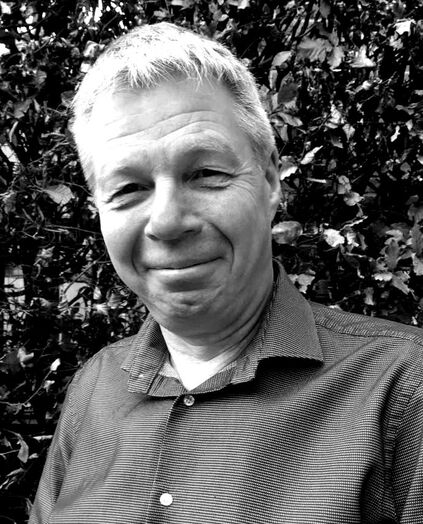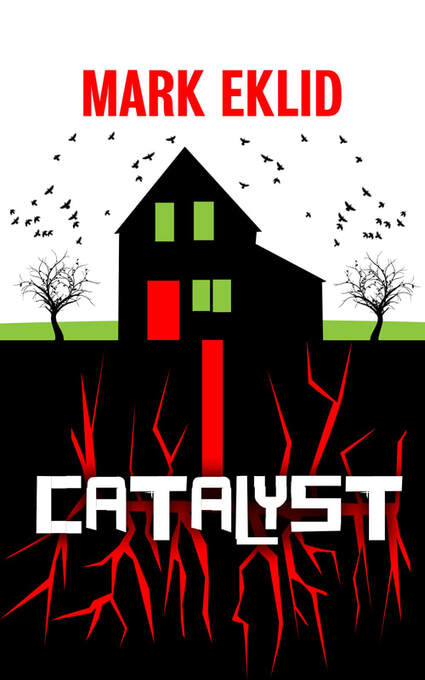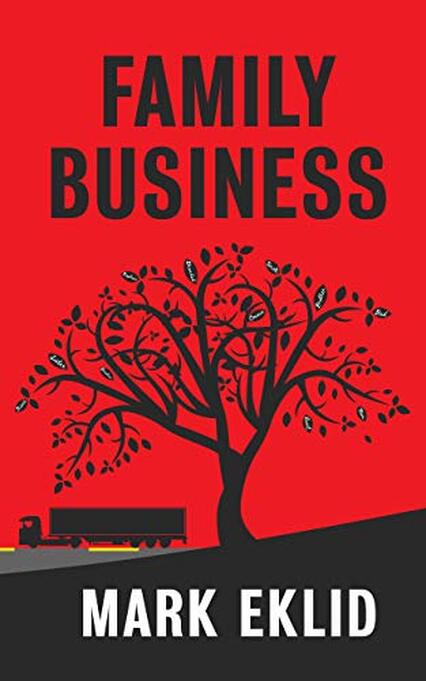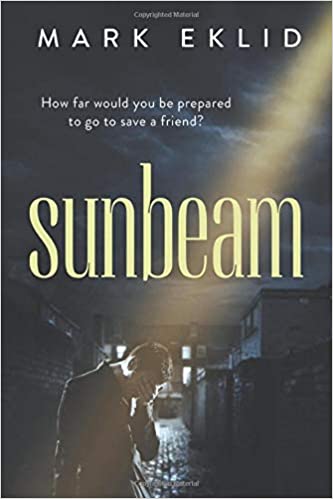
It is with great pleasure that I welcome Mark Eklid onto the website today. Mark is the author of three novels: Sunbeam, Family Business, and Catalyst. All of which are fast-paced thrillers set in his home town of Sheffield.
Alex: Tell us a bit about yourself, Mark.
Mark: I was born in Sheffield almost 59 years ago, the second of four kids, and was fortunate to have a fairly comfortable upbringing. My dad was a bricklayer and my mum was a secretary and they worked hard to give us everything we needed. Mum worked for many years at The Star newspaper and that played a large part in my deciding I wanted to become a sports journalist. I would have preferred to play centre-forward for Sheffield United or open the batting for Yorkshire but lack of ability proved too steep an obstacle to overcome, so I settled for the next-best thing. I landed my first job at the South Yorkshire Times in 1984 – in the heart of mining country at the height of the miners’ strike – and moved to the Derby Telegraph in 1987. For most of my time at Derby I was the county cricket writer, travelling around the country and, occasionally, abroad to follow Derbyshire and that really was a dream job for me. It was too good to last, as it turned out, and when my bosses decided they didn’t want me to write about cricket anymore, I lost my creative outlet.
Alex: Tell us a bit about yourself, Mark.
Mark: I was born in Sheffield almost 59 years ago, the second of four kids, and was fortunate to have a fairly comfortable upbringing. My dad was a bricklayer and my mum was a secretary and they worked hard to give us everything we needed. Mum worked for many years at The Star newspaper and that played a large part in my deciding I wanted to become a sports journalist. I would have preferred to play centre-forward for Sheffield United or open the batting for Yorkshire but lack of ability proved too steep an obstacle to overcome, so I settled for the next-best thing. I landed my first job at the South Yorkshire Times in 1984 – in the heart of mining country at the height of the miners’ strike – and moved to the Derby Telegraph in 1987. For most of my time at Derby I was the county cricket writer, travelling around the country and, occasionally, abroad to follow Derbyshire and that really was a dream job for me. It was too good to last, as it turned out, and when my bosses decided they didn’t want me to write about cricket anymore, I lost my creative outlet.

I struggled with that for a while but I’d always had ideas for novels and had half-developed a few, only to shelve them when the cricket season came around again, so I decided it was time to see one through to the finish. I self-published my first novel, Sunbeam, in November 2019 and my second, Family Business, in June 2020. A third, Catalyst, should be out in February and I’m 10,000 words or so into my fourth, with outline plans scribbled out for two or maybe three more. Well, no point hanging around, is there?
Alex: How would you describe your writing, and are there particular themes that you like to explore?
Mark: I don’t think I’m alone in finding it hard to categorise my own writing. I appreciate that readers want to know what to expect when they find a new author, but it’s not always easy to pigeon hole your work. Broadly, I write fast-moving suspense thrillers. I enjoy trying to keep the reader guessing and try to surprise, or even shock, them. I’m fascinated by how fortunes can take sharp deviations one way or the other through single small twists of fate. That is definitely a recurring theme in my novels. Up to now, I haven’t felt the desire to create a series because I prefer writing novels that stand alone, populated by a new cast of characters. Having said that, I am toying with the idea of making the fourth a two-parter. One thing my novels do have in common is that they are set in and around Sheffield. Though I have lived more than half my life in Derby, I keep being drawn back to the city of my birth.
Alex: How would you describe your writing, and are there particular themes that you like to explore?
Mark: I don’t think I’m alone in finding it hard to categorise my own writing. I appreciate that readers want to know what to expect when they find a new author, but it’s not always easy to pigeon hole your work. Broadly, I write fast-moving suspense thrillers. I enjoy trying to keep the reader guessing and try to surprise, or even shock, them. I’m fascinated by how fortunes can take sharp deviations one way or the other through single small twists of fate. That is definitely a recurring theme in my novels. Up to now, I haven’t felt the desire to create a series because I prefer writing novels that stand alone, populated by a new cast of characters. Having said that, I am toying with the idea of making the fourth a two-parter. One thing my novels do have in common is that they are set in and around Sheffield. Though I have lived more than half my life in Derby, I keep being drawn back to the city of my birth.

Alex: Are you a writer that plans a detailed synopsis or do you set out with a vague idea and let the story unfold as you write?
Mark: I like to have a broad outline in mind when I set out and I will make notes along the way – largely to ensure that I don’t forget ideas. I definitely prefer to have the first couple of chapters quite well mapped out before I start writing and to have a good idea of the ending in my head but I’ve found that it is important to be flexible in between. To an extent, your job is to get it rolling and then cling on and try to enjoy the ride. The storylines can develop minds of their own. Characters can do things that you really didn’t expect them to do. You have to be willing to let them run free and be happy to be in the right place to write it all down.
Alex: Tell us about your latest novel.
Mark: One of the decisions I took before I started writing Catalyst was that it would not have a big body count. I have nothing against murder stories and I killed quite a few characters in Sunbeam and Family Business but, this time, I wanted to see if I could create a compelling plot line without piling up the corpses. I’m happy I did and I believe I pulled it off. Catalyst has an environmental theme.
The two central characters are an earnest but occasionally misguided campaigner who wants to save the planet and a corrupt council leader who plans to make a pile of money from a dodgy housing development. They are set on a collision course by a series of strange coincidences which means that one of them will prevail and the other will be destroyed. One of them will be the catalyst for change – and that change will either be to prevent or to cause a huge environmental disaster.
Mark: I like to have a broad outline in mind when I set out and I will make notes along the way – largely to ensure that I don’t forget ideas. I definitely prefer to have the first couple of chapters quite well mapped out before I start writing and to have a good idea of the ending in my head but I’ve found that it is important to be flexible in between. To an extent, your job is to get it rolling and then cling on and try to enjoy the ride. The storylines can develop minds of their own. Characters can do things that you really didn’t expect them to do. You have to be willing to let them run free and be happy to be in the right place to write it all down.
Alex: Tell us about your latest novel.
Mark: One of the decisions I took before I started writing Catalyst was that it would not have a big body count. I have nothing against murder stories and I killed quite a few characters in Sunbeam and Family Business but, this time, I wanted to see if I could create a compelling plot line without piling up the corpses. I’m happy I did and I believe I pulled it off. Catalyst has an environmental theme.
The two central characters are an earnest but occasionally misguided campaigner who wants to save the planet and a corrupt council leader who plans to make a pile of money from a dodgy housing development. They are set on a collision course by a series of strange coincidences which means that one of them will prevail and the other will be destroyed. One of them will be the catalyst for change – and that change will either be to prevent or to cause a huge environmental disaster.
Alex: Can you remember what the first book you ever read was?
Mark: Not a clue! Something with Janet and John as the main characters, I should expect. I did get my first Beano annual at age eight and I had a full set of Ladybird history books, which I absolutely devoured. I still have them.
Alex: How much research do you do and what does it usually entail?
Mark: Contrary to popular opinion, journalists like to get their facts right. If I’m dealing with a subject or a vocation I don’t know enough about, I seek out someone who does know. Family Business is set at a haulage company, so I spent a day with a local haulage firm. Catalyst explores environmental issues, so I interviewed the leader of a local environmental pressure group. I’m also fortunate to have family connections with the police to get a handle on their procedures. For unfamiliar locations, I will at least explore Google maps street views, if not visit the places myself. It’s so important to do your homework and get it right. If you’re guessing, you’ll be found out.
Alex: Do you ever base your characters on people you have encountered in real life?
Mark: Not as such. I prefer to take note of little idiosyncrasies or characteristics in people I see day to day and build them into my characters. People watching is great!
Alex: Which was the last book you read that blew you away?
Mark: I’m currently reading The Midnight Library by Matt Haig and it is one of the best novels I’ve read for a long time. I do get an awful lot of pleasure from reading novels but, to be honest, I’m more likely to be knocked off my feet by a book based in fact. Sir Ranulph Fiennes’ autobiography was one, so was Martin Middlebrook’s account of the first day of the Somme, and the book I’ve recently finished – a biography of the former Australian cricket captain Kim Hughes – was superb. Fiction is a wonderful distraction but reading about real people or events affects me at a far deeper level.
Alex: How do you market your books?
Mark: I went into marketing my first novel, Sunbeam, as a complete novice and I still feel there is so much to learn. I’ve tried social media campaigns, advertising, book blog tours, creating profiles on many different platforms and none have had other than a modest impact. What I would really love to do is to meet more people face to face, at book fairs or gatherings in clubs and libraries. I did one library meeting last March and had others arranged – but then came the lockdown! I always saw my role as a sports journalist as being to create dialogue, rather than to dictate the way I saw a story, and, in the same way, I really enjoy engaging with readers, directly and on forums such as this. In terms of wider marketing strategy, what I would dearly love is to meet someone who has been there and done that and could tell me “Look, what you really should try is this, this and this” and then sit by my shoulder to answer all my daft questions. There is so much information out there and so much broad advice but it’s so hard to know what to do for the best when you have no record of prior success to look to and take encouragement from. It’s a minefield out there!
Alex: What are your interests aside from writing? And what do you do to unwind?
Mark: I still have a deeply ingrained love of sport and have missed live sport so much this year. What I have missed even more than the events themselves are that football and rugby matches, especially, are chances to spend quality time with my two grown-up sons, who both live in different parts of the country now. Sport – and live music – have been great excuses for us all to share some memorable experiences. In ‘normal’ times, I also love travelling and going to the theatre with my partner, Sue.
Mark: Not a clue! Something with Janet and John as the main characters, I should expect. I did get my first Beano annual at age eight and I had a full set of Ladybird history books, which I absolutely devoured. I still have them.
Alex: How much research do you do and what does it usually entail?
Mark: Contrary to popular opinion, journalists like to get their facts right. If I’m dealing with a subject or a vocation I don’t know enough about, I seek out someone who does know. Family Business is set at a haulage company, so I spent a day with a local haulage firm. Catalyst explores environmental issues, so I interviewed the leader of a local environmental pressure group. I’m also fortunate to have family connections with the police to get a handle on their procedures. For unfamiliar locations, I will at least explore Google maps street views, if not visit the places myself. It’s so important to do your homework and get it right. If you’re guessing, you’ll be found out.
Alex: Do you ever base your characters on people you have encountered in real life?
Mark: Not as such. I prefer to take note of little idiosyncrasies or characteristics in people I see day to day and build them into my characters. People watching is great!
Alex: Which was the last book you read that blew you away?
Mark: I’m currently reading The Midnight Library by Matt Haig and it is one of the best novels I’ve read for a long time. I do get an awful lot of pleasure from reading novels but, to be honest, I’m more likely to be knocked off my feet by a book based in fact. Sir Ranulph Fiennes’ autobiography was one, so was Martin Middlebrook’s account of the first day of the Somme, and the book I’ve recently finished – a biography of the former Australian cricket captain Kim Hughes – was superb. Fiction is a wonderful distraction but reading about real people or events affects me at a far deeper level.
Alex: How do you market your books?
Mark: I went into marketing my first novel, Sunbeam, as a complete novice and I still feel there is so much to learn. I’ve tried social media campaigns, advertising, book blog tours, creating profiles on many different platforms and none have had other than a modest impact. What I would really love to do is to meet more people face to face, at book fairs or gatherings in clubs and libraries. I did one library meeting last March and had others arranged – but then came the lockdown! I always saw my role as a sports journalist as being to create dialogue, rather than to dictate the way I saw a story, and, in the same way, I really enjoy engaging with readers, directly and on forums such as this. In terms of wider marketing strategy, what I would dearly love is to meet someone who has been there and done that and could tell me “Look, what you really should try is this, this and this” and then sit by my shoulder to answer all my daft questions. There is so much information out there and so much broad advice but it’s so hard to know what to do for the best when you have no record of prior success to look to and take encouragement from. It’s a minefield out there!
Alex: What are your interests aside from writing? And what do you do to unwind?
Mark: I still have a deeply ingrained love of sport and have missed live sport so much this year. What I have missed even more than the events themselves are that football and rugby matches, especially, are chances to spend quality time with my two grown-up sons, who both live in different parts of the country now. Sport – and live music – have been great excuses for us all to share some memorable experiences. In ‘normal’ times, I also love travelling and going to the theatre with my partner, Sue.

Alex: Which authors do you particularly admire and why?
Mark: Of the modern authors, I have read a lot of Jonathan Coe, Linwood Barclay and Nick Hornby. Coe is smart, challenging and funny. Barclay is an unsurpassed master of the crime thriller and Hornby has a gloriously light touch. I also love Bill Bryson because he is the ultimate good travelling companion but, as an all-time favourite, I’m afraid I’m going to expose myself as a bit of a cliché. Nobody comes close to Charles Dickens for me. Timeless.
Alex: Thank you so much Mark for sharing this. It's been an absolute delight to chat with you. And here's wishing you luck with your latest page-turner.
Mark: My pleasure, Alex. Thank you for having me on.
Mark: Of the modern authors, I have read a lot of Jonathan Coe, Linwood Barclay and Nick Hornby. Coe is smart, challenging and funny. Barclay is an unsurpassed master of the crime thriller and Hornby has a gloriously light touch. I also love Bill Bryson because he is the ultimate good travelling companion but, as an all-time favourite, I’m afraid I’m going to expose myself as a bit of a cliché. Nobody comes close to Charles Dickens for me. Timeless.
Alex: Thank you so much Mark for sharing this. It's been an absolute delight to chat with you. And here's wishing you luck with your latest page-turner.
Mark: My pleasure, Alex. Thank you for having me on.
